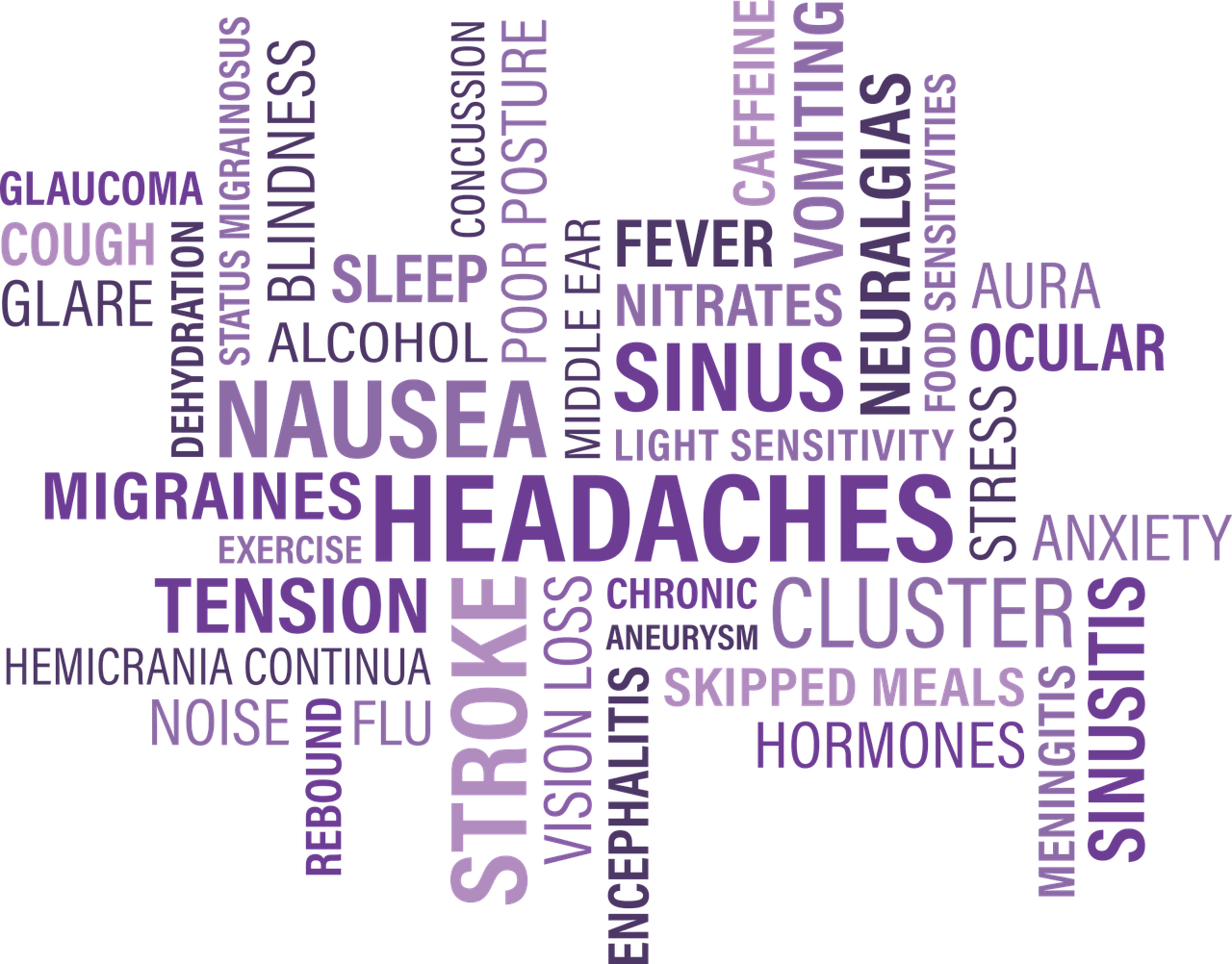Headache and Migraine
What is it? How does it happen?
Many of us are familiar with headaches, as it is very common. Taken literally, it refers to pain of the head. There are many different types of headaches: migraines, cluster, tension, and cervicogenic, to name a few. The vast majority of people will experience a headache at least once in their life; some will go on to have chronic (or recurring) headaches.
It is theorized that headaches are caused by either a change in the blood flow to the brain, or a change in the electrical activity within the brain. It is not completely known why we have headaches. Rarely, headaches can be sign of an underlying neurological condition.
Migraines can become a big problem when they are out of control. Much like a hurricane, they create a vicious cycle which intensifies over time, unless the cycle is broken.


Signs & Symptoms
What does it feel like? How do I know my headache could be more than "just a headache?"
One or any combination of:
- Head pain: ex: sharp, dull, thrombbing, pounding, band-like
- sensitivity to light, sound, or smell
- nausea, vomiting, or change in appetite
- consistent warning signs or aura
- Associated symptoms: mental fogginess, fatigue, blurred vision, nasal congestion, watery eyes
Red Flags
If you have any of these features, go directly to the ER.
Call 911 or go to the ER:
- The worst headache or migraine you've ever experienced
- Loss of vision
- Loss of consciousness
- Uncontrollable vomiting
- Headache or Migraine lasts more than 72 hours
- Stroke symptoms (weakness, numbness, difficulty speaking or reading, facial droop, see Stroke Info)
Who typically gets it?
Triggers
Migraines are the best characterized headache type in this regard. These risk factors are very common triggers for migraines.
Female Gender
Perhaps due to hormonal differences, women more prevalently have migraine. Many women notice changes in headache patterns around menstrual cycles, as well.
Dietary Triggers
Many people have dietary triggers; avoidance of the trigger generally improves the migraines.
Alcohol
Many find they have a migraine after alcohol use.
Weather
Some are very sensitive to changes in weather or barometric pressure.
Medication Overuse
Even the very medications used to get rid of headaches and migraines can trigger a vicious cycle of migraines.
What can I do about a migraine?
Treatment Options

Dietary Modification & Trigger Avoidance
The most conservative option would be to remove the possible trigger, whether it is dietary or lifestyle related.
Pain Relievers
If your migraines are not very frequent, you may only need occasional over the counter pain medication, as long as your doctor says it is safe to do so.
On the other hand, it you overuse pain medication, it will have the opposite effect- your migraines may become more frequent.
Migraine Diary
Keep track of your migraines, using a calendar or an app (such as Migraine Buddy, for example). Record possible triggers, medication or treatment (and if it was effective or not), and anything else that seems to be a pattern. Apps seem to be easier to use- they are always with you, they make it easier to record an attack, and they will automatically pull data and analyze for patterns and possible triggers. If there is one most important thing you can do for yourself to better understand your headaches/migraines, this would be it. Bring the record to your doctor's appointment for review.
Hydrate by Day and Sleep Tight at Night
Good hydration is at least 8 glasses of water (8 oz each) each day. That's 64 ounces of water- and it is tough to get that much water when you don't feel good. Try sipping some broth or water with lemon if you aren't able to eat due to nausea or vomiting.
High quality sleep "resets" the brain. Many times, an attack will abate with sleep alone. Good sleep hygiene tip #1: diligently turn off all devices one hour before bed. In this day and age, this can be tough.
How can MIND help?
Our Services
Not only do we consult on your case to perform a Root Cause Analysis, you will also learn new habits to prevent headaches and migraines.
Nutrition
We specialize in lifestyle changes tailored to patients. Small changes can make a big difference- and we don't believe in sacrificing flavor.
Exercise
30 minutes per day, 5 days per week. Let us help figure out a plan that appeals to you! (Hint: it shouldn't hurt!)
Medication
We do believe certain medications get the job done and are necessary, but we believe in low and slow dosing when appropriate, and will always take your preferences into account.
Complementary Therapies
This may include supplements, acupuncture, yoga, massage, and more, and is tailored to your comfort level.
The Bottom Line
Headaches and migraines are very common and can be debilitating or can mimic a stroke. Always go to the ER or call 911 if you have stroke symptoms!
There are many treatment options for headaches and migraines, including integrative and Western medicine options. If you are suffering from severe or frequent headaches, or have any associated red flag or neurological symptoms (above), please present to the ER for emergency work up (to rule out a stroke) and if you are not having a stroke, see a neurologist!
Additional Resources
Take a deeper dive:


